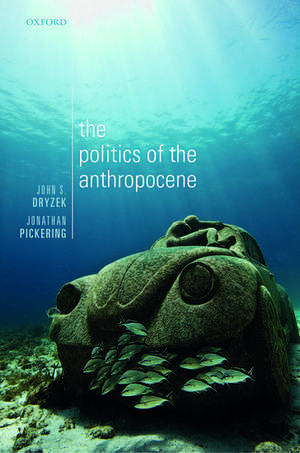The Politics of the Anthropocene
Autor John S. Dryzek, Jonathan Pickeringen Limba Engleză Paperback – 13 dec 2018
Preț: 200.00 lei
Preț vechi: 230.82 lei
-13% Nou
Puncte Express: 300
Preț estimativ în valută:
38.27€ • 41.70$ • 32.25£
38.27€ • 41.70$ • 32.25£
Carte tipărită la comandă
Livrare economică 12-18 aprilie
Livrare express 19-25 martie pentru 58.26 lei
Preluare comenzi: 021 569.72.76
Specificații
ISBN-13: 9780198809623
ISBN-10: 019880962X
Pagini: 208
Dimensiuni: 157 x 234 x 12 mm
Greutate: 0.45 kg
Editura: OUP OXFORD
Colecția OUP Oxford
Locul publicării:Oxford, United Kingdom
ISBN-10: 019880962X
Pagini: 208
Dimensiuni: 157 x 234 x 12 mm
Greutate: 0.45 kg
Editura: OUP OXFORD
Colecția OUP Oxford
Locul publicării:Oxford, United Kingdom
Recenzii
The book is persuasive and beautifull written, bringing forth a realistic and optimistic account of how humanscan reorganize themselves to better govern in the emerging epochPerhaps most importantly, the book offers hope that human reason and communication with one another and with the Earth system can rise to the challenges of the Anthropocene.
This is a salutatory warning for social scientists who study international institutions and the United Nations system, but one that needs to be taken seriously especially when it runs against the overwhelming impetus to be "policy relevant" to generate solutions to what are presented as solvable "problems". The Anthropocene requires more fundamental thinking, and as such this volume is a useful antidote to technocratic assumptions that there are simple solutions to issues that are better coped with reflexively as sets of interconnected complicated changing circumstances.
This is a salutatory warning for social scientists who study international institutions and the United Nations system, but one that needs to be taken seriously especially when it runs against the overwhelming impetus to be "policy relevant" to generate solutions to what are presented as solvable "problems". The Anthropocene requires more fundamental thinking, and as such this volume is a useful antidote to technocratic assumptions that there are simple solutions to issues that are better coped with reflexively as sets of interconnected complicated changing circumstances.
Notă biografică
John S. Dryzek is Australian Research Council Laureate Fellow and Centenary Professor in the Centre for Deliberative Democracy and Global Governance at the Institute for Governance and Policy Analysis, University of Canberra. He is best known for his contributions in democratic theory and practice and environmental politics. He is co-editor of The Oxford Handbook of Deliberative Democracy (2018) and The Oxford Handbook of Climate Change and Society (2011), and the author of many books, including The Politics of the Earth (3rd edition, Oxford University Press, 2013).Jonathan Pickering is a Postdoctoral Fellow in the Centre for Deliberative Democracy and Global Governance at the Institute for Governance and Policy Analysis, University of Canberra. His research focuses on global environmental governance, climate ethics and policy, and deliberative democracy. His research has been published in a range of journals including Climate Policy, Ecological Economics, Global Environmental Politics, International Environmental Agreements, and World Development.
